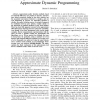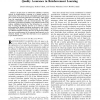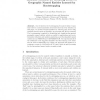161 search results - page 24 / 33 » Iterative learning fuzzy control |
130
Voted
CDC
2010
IEEE
14 years 9 months ago
2010
IEEE
Approximate policy iteration methods based on temporal differences are popular in practice, and have been tested extensively, dating to the early nineties, but the associated conve...
150
click to vote
ICML
2006
IEEE
2006
IEEE
Automatic basis function construction for approximate dynamic programming and reinforcement learning
15 years 8 months ago
We address the problem of automatically constructing basis functions for linear approximation of the value function of a Markov Decision Process (MDP). Our work builds on results ...
100
click to vote
ICONIP
2009
15 years 4 days ago
2009
Reinforcement learning induces non-stationarity at several levels. Adaptation to non-stationary environments is of course a desired feature of a fair RL algorithm. Yet, even if the...
104
click to vote
IJCNN
2008
IEEE
15 years 8 months ago
2008
IEEE
— In this paper we address the reliability of policies derived by Reinforcement Learning on a limited amount of observations. This can be done in a principled manner by taking in...
127
click to vote
IJCNLP
2005
Springer
15 years 8 months ago
2005
Springer
Abstract. One of issues in the bootstrapping for named entity recognition is how to control annotation errors introduced at every iteration. In this paper, we present several heuri...



